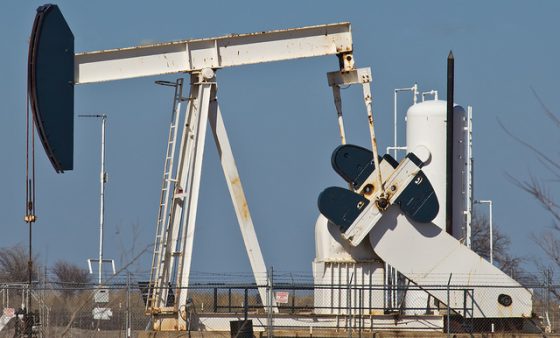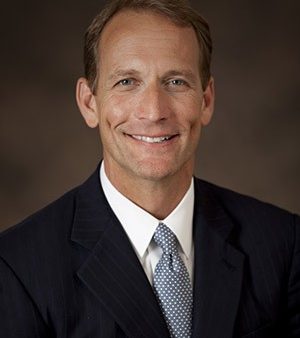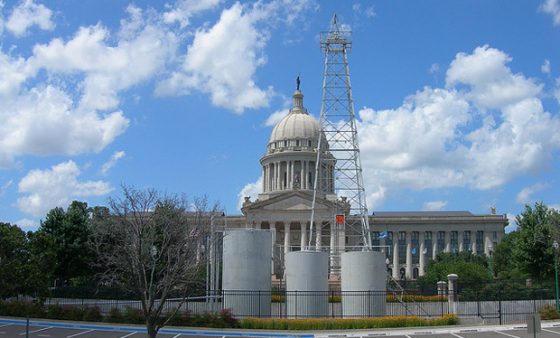Chesapeake Energy
Chesapeake Energy Corp. is the second-largest natural gas extractor in the United States.
The company focuses on unconventional onshore oil and natural gas plays in the U.S., and while Chesapeake’s roots are in natural gas, near-record low prices have forced the company to shift focus to oil production and other petroleum liquids.
Chesapeake employs about 13,000. About 4,600 people work at the company’s corporate headquarters in Oklahoma City. Chesapeake has regional corporate offices in Texas, West Virginia and Louisiana, and 60 field offices throughout the U.S.
Chesapeake is an aggressive spender and has continued to expand, despite the fact that natural gas prices are at a 10-year low. The company currently holds more than $13 billion in debt.
Chesapeake CEO Aubrey McClendon founded the company with Tom Ward — now CEO of SandRidge Energy — in 1989.

Brett Deering / Getty Images
Chesapeake Energy CEO Aubrey McClendon and Oklahoma City Thunder owner Clay Bennet chat during an Oklahoma City Thunder game.
CEO Controversy
McClendon is something of a natural gas evangelist, and is happy to mix it up with anti-drilling activists. Of Chesapeake, he once bragged to Rolling Stone that “we’re the world’s biggest frackers.”
In March, the Pittsburgh Post-Gazette reported that McClendon was taking out loans against the company’s West Virginia holdings. Reuters expanded its investigation by reporting that this was happening in multiple states: McClendon has taken out more than $1 billion in loans, using Chesapeake’s land holdings as collateral.
McClendon was able to purchase personal stakes in Chesapeake’s wells through an initiative called the “Founder Well Participation Program.” Chesapeake shut the program down shortly after it became public.
While he was CEO and chairman of Chesapeake’s board, McClendon was also running a lucrative side business with Ward: a $200 million private hedge fund called Heritage Management Company LLC., a Reuters’ investigation revealed.
Some analysts and corporate governance experts have said that the arrangement amounts to a front business for Chesapeake, because the fund traded the same commodities Chesapeake produced. Critics have also said the arrangement created a conflict of interest for the two businesses, whether real or apparent.
Corporate Concerns
The company lost $71 million in this year’s first quarter, and had to scale back its cash flow estimate for this year from around $5 billion to under $3 billion. Last month, the company borrowed an additional $4 billion. Chesapeake said the increase was the product of strong demand from investors willing to buy its debt.
The stock and the company’s credit rating have taken beatings, the Securities and Exchange Commission is looking into Chesapeake’s CEO well perk, and shareholders have filed lawsuits.
But many analysts and investors say Chesapeake has a vast asset portfolio and argue its stock is undervalued. Billionaire activist investor Carl Icahn — who made hundreds of millions turning around Chesapeake stock a few years ago — is among them. In late May, he became Chesapeake’s second-largest shareholder, and quickly demanded a board shake-up.
Latest stories
Aubrey McClendon Dead One Day After Being Charged In Bid-Rigging Conspiracy
Reaction to McClendon’s death continues to pour in.
Pennsylvania Attorney General Sues Chesapeake Energy for ‘Deceptive’ Gas Leases
Oil and Gas Industry Struggles Being Felt Throughout Oklahoma’s Economy
More than 500 Oklahoma employees of Chesapeake Energy are out of a job following the latest layoffs Sept. 29th.
Three of Oklahoma’s Largest Oil Companies’ Plan for How the State Should Tax Them
First Bill Signing of 2013 Shows What Can Happen When Corporations Help Write Law
This story is about a bill. A measure that was ineffective, had unintended consequences, and had to be undone. A bill that a giant Oklahoma energy company helped write — and helped fight.








